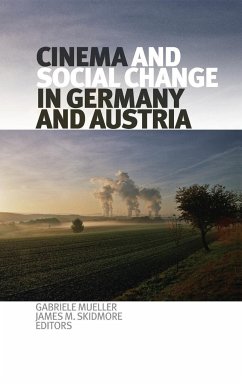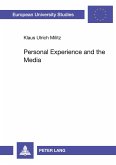Cinema and Social Change in Germany and Austria
Herausgeber: Mueller, Gabriele; Skidmore, James M.
Versandkostenfrei innerhalb Deutschlands
35,99 €
inkl. MwSt.
Versandkostenfrei*
Erscheint vorauss. 20. Januar 2026
Melden Sie sich
hier
hier
für den Produktalarm an, um über die Verfügbarkeit des Produkts informiert zu werden.

18 °P sammeln
Cinema and Social Change in Germany and Austria
Herausgeber: Mueller, Gabriele; Skidmore, James M.
- Broschiertes Buch
This book explores contemporary German and Austrian cinema and the trend away from "cinema of consensus" toward a more heterogeneous and critical cinema culture. Functioning both as a product and as an agent of globalizing processes, this new cinema mediates and influences important political and social debates.
Andere Kunden interessierten sich auch für
![Cinema and Social Change in Germany and Austria Cinema and Social Change in Germany and Austria]() Cinema and Social Change in Germany and Austria89,99 €
Cinema and Social Change in Germany and Austria89,99 €![Personal Experience and the Media Personal Experience and the Media]() Klaus Ulrich MilitzPersonal Experience and the Media71,95 €
Klaus Ulrich MilitzPersonal Experience and the Media71,95 €![The Craft of Rehearsal The Craft of Rehearsal]() James ThomasThe Craft of Rehearsal97,20 €
James ThomasThe Craft of Rehearsal97,20 €![Bernard Shaw in Brazil Bernard Shaw in Brazil]() Rosalie Rahal HaddadBernard Shaw in Brazil78,85 €
Rosalie Rahal HaddadBernard Shaw in Brazil78,85 €![Austria Made in Hollywood Austria Made in Hollywood]() Jacqueline VansantAustria Made in Hollywood98,99 €
Jacqueline VansantAustria Made in Hollywood98,99 €![Jacques Copeau's Friends and Disciples Jacques Copeau's Friends and Disciples]() Thomas John DonahueJacques Copeau's Friends and Disciples88,75 €
Thomas John DonahueJacques Copeau's Friends and Disciples88,75 €![The Joy of Rehearsal The Joy of Rehearsal]() James ThomasThe Joy of Rehearsal49,70 €
James ThomasThe Joy of Rehearsal49,70 €-
-
-
This book explores contemporary German and Austrian cinema and the trend away from "cinema of consensus" toward a more heterogeneous and critical cinema culture. Functioning both as a product and as an agent of globalizing processes, this new cinema mediates and influences important political and social debates.
Produktdetails
- Produktdetails
- Verlag: MNG University Presses
- Seitenzahl: 314
- Erscheinungstermin: 20. Januar 2026
- Englisch
- Abmessung: 229mm x 152mm x 25mm
- Gewicht: 1g
- ISBN-13: 9781554585601
- ISBN-10: 1554585600
- Artikelnr.: 50018624
- Herstellerkennzeichnung
- Libri GmbH
- Europaallee 1
- 36244 Bad Hersfeld
- gpsr@libri.de
- Verlag: MNG University Presses
- Seitenzahl: 314
- Erscheinungstermin: 20. Januar 2026
- Englisch
- Abmessung: 229mm x 152mm x 25mm
- Gewicht: 1g
- ISBN-13: 9781554585601
- ISBN-10: 1554585600
- Artikelnr.: 50018624
- Herstellerkennzeichnung
- Libri GmbH
- Europaallee 1
- 36244 Bad Hersfeld
- gpsr@libri.de
Gabriele Mueller is an associate professor of German Studies and affiliated with the Canadian Centre for German and European Studies at York University, Toronto. Her research focuses mainly on German cultural studies and German film studies. She has published essays on various aspects of post-unification German film, in particular on cinematic contributions to cultural memory discourses. James M. Skidmore teaches German literature, film, and cultural studies at the University of Waterloo. His research focuses mainly on the intersections of politics, history, and societal development in narrative literature and film. He is the author of The Trauma of Defeat: Ricarda Huch’s Historiography during the Weimar Republic (2005), as well as articles on German and Canadian literature and film.
* List of Illustrations
* Acknowledgements
* 1. Gabriele Mueller & James M. Skidmore: Cinema of Dissent?
Confronting Social, Economic, and Political Change in German-Language
Cinema
* Challenging Viewing Habits
* 2. Marco Abel: The Counter-Cinema of the Berlin School
* 3 Sophie Boyer: The Triumph of Hyperreality: A Baudrillardian Reading
of Michael Haneke’s Cinematic Oeuvre
* 4. Morgan Koerner: Subversions of the Medical Gaze: Disability and
Media Parody in Christoph Schlingensief’s Freakstars 3000
* Reassessing and Consuming History
* 5. Roger Cook: Literary Discourse and Cinematic Narrative: Scripting
Affect in Das Leben der Anderen
* 6. Alasdair King: Heimat 3: Edgar Reitz’s Time Machine
* 7. Joanne Leal: Troubled Parents, Angry Children: The Difficult
Legacy of 1968 in Contemporary German-Language Film
* 8. Mary-Elizabeth O’Brien: Creative Chaos as Political Strategy in
Recent German-Language Cinema
* 9. Florentine Strzelczyk: “Looking for an Old Man with a Black
Moustache”: Hitler, Humour, Fake, and Forgery in Schtonk!
* 10. Peter Gölz: Haha Hitler! Coming to Terms with Dani Levy
* Questioning Collective Identities
* 11. Myriam Léger: German Fascination for Jews in Oliver
Hirschbiegel’s Ein ganz gewöhnlicher Jude
* 12. Jakub Kazecki: Border, Bridge, or Barrier? Images of
German–Polish Borderlands in German Cinema of the 2000s
* 13. Michael Zimmermann: The Transnational Deutschkei in Yilmaz
Arslan’s Brudermord
* 14. Alice Kuzniar: Diasporic Queers: Reading for the Intersections of
Alterities in Recent German Cinema
* An Insider’s View
* 15. Barbara Pichler: The Construction of Reality: Aspects of Austrian
Cinema between Fiction and Documentary
* Filmography
* Notes on Contributors
* Index
* Acknowledgements
* 1. Gabriele Mueller & James M. Skidmore: Cinema of Dissent?
Confronting Social, Economic, and Political Change in German-Language
Cinema
* Challenging Viewing Habits
* 2. Marco Abel: The Counter-Cinema of the Berlin School
* 3 Sophie Boyer: The Triumph of Hyperreality: A Baudrillardian Reading
of Michael Haneke’s Cinematic Oeuvre
* 4. Morgan Koerner: Subversions of the Medical Gaze: Disability and
Media Parody in Christoph Schlingensief’s Freakstars 3000
* Reassessing and Consuming History
* 5. Roger Cook: Literary Discourse and Cinematic Narrative: Scripting
Affect in Das Leben der Anderen
* 6. Alasdair King: Heimat 3: Edgar Reitz’s Time Machine
* 7. Joanne Leal: Troubled Parents, Angry Children: The Difficult
Legacy of 1968 in Contemporary German-Language Film
* 8. Mary-Elizabeth O’Brien: Creative Chaos as Political Strategy in
Recent German-Language Cinema
* 9. Florentine Strzelczyk: “Looking for an Old Man with a Black
Moustache”: Hitler, Humour, Fake, and Forgery in Schtonk!
* 10. Peter Gölz: Haha Hitler! Coming to Terms with Dani Levy
* Questioning Collective Identities
* 11. Myriam Léger: German Fascination for Jews in Oliver
Hirschbiegel’s Ein ganz gewöhnlicher Jude
* 12. Jakub Kazecki: Border, Bridge, or Barrier? Images of
German–Polish Borderlands in German Cinema of the 2000s
* 13. Michael Zimmermann: The Transnational Deutschkei in Yilmaz
Arslan’s Brudermord
* 14. Alice Kuzniar: Diasporic Queers: Reading for the Intersections of
Alterities in Recent German Cinema
* An Insider’s View
* 15. Barbara Pichler: The Construction of Reality: Aspects of Austrian
Cinema between Fiction and Documentary
* Filmography
* Notes on Contributors
* Index
* List of Illustrations
* Acknowledgements
* 1. Gabriele Mueller & James M. Skidmore: Cinema of Dissent?
Confronting Social, Economic, and Political Change in German-Language
Cinema
* Challenging Viewing Habits
* 2. Marco Abel: The Counter-Cinema of the Berlin School
* 3 Sophie Boyer: The Triumph of Hyperreality: A Baudrillardian Reading
of Michael Haneke’s Cinematic Oeuvre
* 4. Morgan Koerner: Subversions of the Medical Gaze: Disability and
Media Parody in Christoph Schlingensief’s Freakstars 3000
* Reassessing and Consuming History
* 5. Roger Cook: Literary Discourse and Cinematic Narrative: Scripting
Affect in Das Leben der Anderen
* 6. Alasdair King: Heimat 3: Edgar Reitz’s Time Machine
* 7. Joanne Leal: Troubled Parents, Angry Children: The Difficult
Legacy of 1968 in Contemporary German-Language Film
* 8. Mary-Elizabeth O’Brien: Creative Chaos as Political Strategy in
Recent German-Language Cinema
* 9. Florentine Strzelczyk: “Looking for an Old Man with a Black
Moustache”: Hitler, Humour, Fake, and Forgery in Schtonk!
* 10. Peter Gölz: Haha Hitler! Coming to Terms with Dani Levy
* Questioning Collective Identities
* 11. Myriam Léger: German Fascination for Jews in Oliver
Hirschbiegel’s Ein ganz gewöhnlicher Jude
* 12. Jakub Kazecki: Border, Bridge, or Barrier? Images of
German–Polish Borderlands in German Cinema of the 2000s
* 13. Michael Zimmermann: The Transnational Deutschkei in Yilmaz
Arslan’s Brudermord
* 14. Alice Kuzniar: Diasporic Queers: Reading for the Intersections of
Alterities in Recent German Cinema
* An Insider’s View
* 15. Barbara Pichler: The Construction of Reality: Aspects of Austrian
Cinema between Fiction and Documentary
* Filmography
* Notes on Contributors
* Index
* Acknowledgements
* 1. Gabriele Mueller & James M. Skidmore: Cinema of Dissent?
Confronting Social, Economic, and Political Change in German-Language
Cinema
* Challenging Viewing Habits
* 2. Marco Abel: The Counter-Cinema of the Berlin School
* 3 Sophie Boyer: The Triumph of Hyperreality: A Baudrillardian Reading
of Michael Haneke’s Cinematic Oeuvre
* 4. Morgan Koerner: Subversions of the Medical Gaze: Disability and
Media Parody in Christoph Schlingensief’s Freakstars 3000
* Reassessing and Consuming History
* 5. Roger Cook: Literary Discourse and Cinematic Narrative: Scripting
Affect in Das Leben der Anderen
* 6. Alasdair King: Heimat 3: Edgar Reitz’s Time Machine
* 7. Joanne Leal: Troubled Parents, Angry Children: The Difficult
Legacy of 1968 in Contemporary German-Language Film
* 8. Mary-Elizabeth O’Brien: Creative Chaos as Political Strategy in
Recent German-Language Cinema
* 9. Florentine Strzelczyk: “Looking for an Old Man with a Black
Moustache”: Hitler, Humour, Fake, and Forgery in Schtonk!
* 10. Peter Gölz: Haha Hitler! Coming to Terms with Dani Levy
* Questioning Collective Identities
* 11. Myriam Léger: German Fascination for Jews in Oliver
Hirschbiegel’s Ein ganz gewöhnlicher Jude
* 12. Jakub Kazecki: Border, Bridge, or Barrier? Images of
German–Polish Borderlands in German Cinema of the 2000s
* 13. Michael Zimmermann: The Transnational Deutschkei in Yilmaz
Arslan’s Brudermord
* 14. Alice Kuzniar: Diasporic Queers: Reading for the Intersections of
Alterities in Recent German Cinema
* An Insider’s View
* 15. Barbara Pichler: The Construction of Reality: Aspects of Austrian
Cinema between Fiction and Documentary
* Filmography
* Notes on Contributors
* Index







